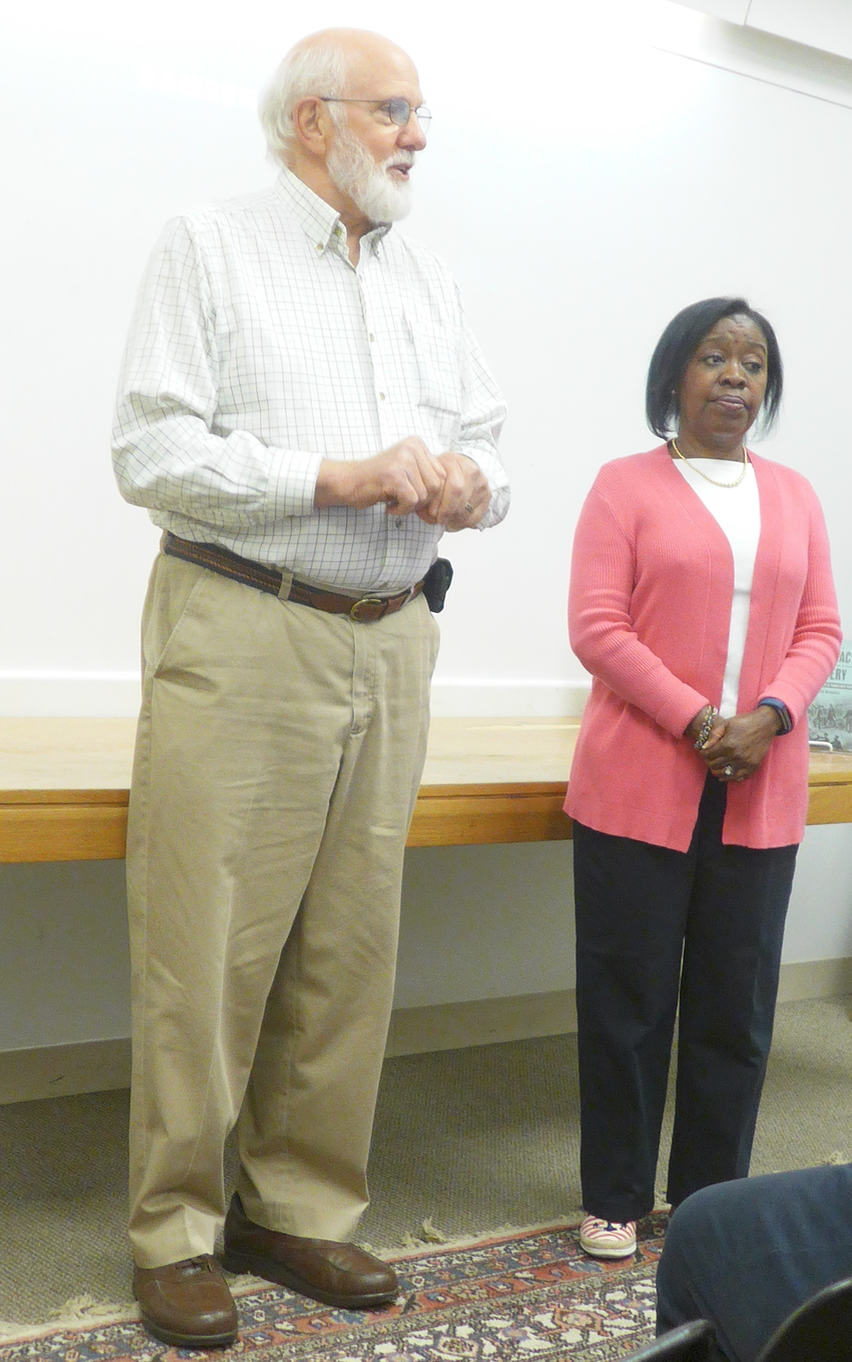"Traces of the Trade," by Filmmaker Katrina Browne, a Descendant of the Largest Slave-trading Family in the US, Lays Bare New England's Complicity in Slavery and its Institutional Amnesia About It
When filmmaker Katrina Browne read her grandmother’s words two decades ago about the illustrious and prosperous Rhode Island family she was a part of, she noticed a brief reference to the ‘unpleasantness’ of the family’s trade in slaves. What she suddenly realized could be the true story of her ancestors rocked Browne to the bottom of her soul, said Dain Perry, her cousin, and led her to produce the documentary, Traces of the Trade: A Story from the Deep North.
Shown to a packed audience at the South End library in September, Perry and his wife, Constance, who descended from slaves, facilitated the movie’s discussion, and described it as the unvarnished history of the largest slave-trading family in the United States, the DeWolfes, of Bristol, Rhode Island. “What happened then is not taught in schools or discussed at the dinner table,” Dain Perry said. “We suffer from institutional amnesia, but Katrina wants us to discuss it. Slavery is a cancer on the soul of our nation. We have to build the muscle to talk about it. We don’t look for finger-pointing or guilt. We want to better understand how we became so stuck over race. It is not a problem of our own making. It is a terrible legacy. Our job is to figure out how to move forward as a nation.”
The DeWolfe cousins preparing for the trip that retraced their ancestors’ slave routes.
Browne had never made a movie before but delved into the archives of her ancestral home, now a museum, in Bristol. With ten of her cousins, including Dain, she traveled to re-trace the route the slave ships sailed, from Bristol to Cuba to West Africa, with rum to trade for African men, women and children. The documentary tells the story of how West-Africans were captured, baptized, made slaves in the name of God, and taken to DeWolfe plantations in Cuba. They were sold at auction in Havana and Charleston, while sugar and molasses were brought from Cuba to the family-owned rum distilleries in Bristol. In the movie, another DeWolfe cousin sarcastically described the “brilliant vertical integration” of the DeWolfe empire on three continents, with slaves, ship-building, industrial processing of rum with molasses and sugar, as well as trade in textiles. Another of the cousins remarked upon the stomach for violence slave-trading required: A letter in archives requested a whipping pole be moved from in front of the writer’s store as it caused “blood to be splattered on the window panes.”
FOSEL board member, Gary Bailey, introducing Traces of the Trade: A Story from the Deep North
The documentary premiered at the Sundance Film Festival in 2008, and was nominated for an Emmy for Excellence in Historical Research. FOSEL board member, Gary Bailey, an assistant dean for Community Engagement and Social Justice at Simmons University, introduced the Perrys and, referring to his own family’s history, said, “Three of my great grandparents had been enslaved. There can be no reconciliation without acknowledgment of slavery. The descendants of the DeWolfe family have begun to do the hard work of telling their story.”
Files in the Bristol Historical society show that slave-trading was supported by the whole town of Bristol and all the coastal towns along the New England shoreline, even when slave-trading had become illegal. The DeWolfe family sold shares to finance their voyages, and founded their own banks, insurance companies, distilleries and shipbuilding enterprises. They transported as many as twenty thousand enslaved Africans and amassed a fortune, together with enormous political power. By the end of his life, James DeWolf had been a U.S. Senator, receiving dispensation and favors from Thomas Jefferson, whose brother was installed as a customs official in Bristol to made sure the illegal slave trade could continue in that town.
Dain and Constance Perry, former South End residents, one descended from slave traders and the other from enslaved Africans, respectively, facilitated an audience discussion after the screening.
Dain and Constance Perry lived in the South End four decades ago, he on Rutland Square, and she on Dilworth Street, once part of the New York Streets area, which no longer exists. She remembers “Mr. Crite” painting pictures of the neighborhood, a reference to Allan Rohan Crite, the now-famous painter of South End scenery. In the post-movie discussion, Constance Perry said that “my Jewish friends celebrate and remember their difficulties. They emphasize the importance of remembering. It is not the same here when it comes to those who were enslaved. We want to forget, not remember. We should remember through a lens of truth. Kierkegaard said that “we live our lives moving forward but we understand our lives by looking back.”
She and Dain Perry asked the audience for one word to describe their feelings after seeing the movie, which produced a long list: Frustration; Sadness; Loss; Grieving; Hope; Anxious; Urgency; Disconnected; Terrified; Learning; Legacy; Gratitude; Truth; Aware; Anger; Shame; Despair; Lucky; Greed; Power; Useless; Time; Unknown; Ache; Resilient; Forgiveness; and Uncovered. Asked to elaborate on their words, one member of he audience said that after seeing the movie the idea of a white person’s ‘proud ancestry’ as the foundation of his life is somewhat ‘shakey.’ Another said that “white privilege is not about money, but about power.”




